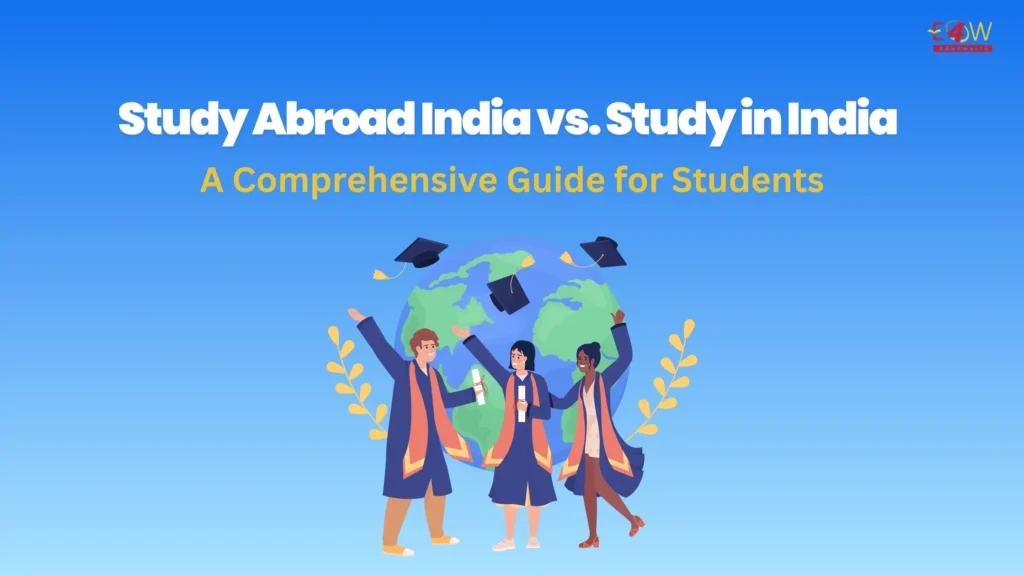The decision to pursue higher education is one of the most critical choices in a student’s life. With globalization opening doors to endless opportunities, the debate between Study Abroad India and studying in India has become increasingly relevant. Both options come with their unique advantages and challenges, making it essential for students to weigh their options carefully. This article delves deep into the Study Abroad India vs. Study in India debate, providing insights into the academic, financial, cultural, and career-related aspects of both choices. Whether you’re a student or a parent guiding your child, this comprehensive guide will help you make an informed decision about whether to Study Abroad India or stay in India for your education.
Table of Contents
Why the Study Abroad India vs. Study in India Debate Matters
The choice between Study Abroad India and studying in India is not just about education; it’s about shaping your future. The global job market is highly competitive, and the decision you make today can significantly impact your career trajectory. Let’s explore the key factors that differentiate Study Abroad India and studying in India.
Academic Excellence and Global Exposure
Study Abroad India: A Gateway to World-Class Education
When you choose to Study Abroad India, you gain access to some of the world’s top-ranked universities. Countries like the USA, UK, Canada, Australia, and Germany are renowned for their academic excellence, cutting-edge research facilities, and innovative teaching methodologies.
- Diverse Curriculum: Universities abroad often offer a more flexible and diverse curriculum, allowing students to tailor their courses according to their interests.
- Research Opportunities: Many international universities are at the forefront of research and innovation, providing students with opportunities to work on groundbreaking projects.
- Global Networking: Choosing to Study Abroad India allows you to build a network with peers and professors from around the world, which can be invaluable for your future career.
Study in India: Affordable and Quality Education
India is home to several prestigious institutions like the IITs, IIMs, and AIIMS, which are globally recognized for their academic rigor.
- Affordability: The cost of education in India is significantly lower compared to choosing to Study Abroad India.
- Cultural Familiarity: Studying in India allows students to stay close to their roots, which can be comforting for many.
- Growing Infrastructure: With initiatives like the National Education Policy (NEP) 2020, India is rapidly improving its educational infrastructure and quality.
Financial Considerations: Cost of Education

Study Abroad India: High Investment, High Returns
Studying abroad is often associated with high tuition fees and living expenses. However, the investment can yield substantial returns in terms of career opportunities and global exposure.
- Tuition Fees: Depending on the country and university, tuition fees for those who choose to Study Abroad India can range from 10,000to10,000to50,000 per year.
- Living Expenses: Accommodation, food, and transportation can add significantly to the overall cost of choosing to Study Abroad India.
- Scholarships and Financial Aid: Many universities offer scholarships to international students, which can help offset the costs of choosing to Study Abroad India.
Study in India: Cost-Effective Education
Studying in India is far more affordable, making it an attractive option for many students.
- Lower Tuition Fees: The average annual tuition fee for top Indian universities ranges from INR 50,000 to INR 2,00,000, which is significantly lower than the cost to Study Abroad India.
- Minimal Living Costs: Living expenses in India are relatively low, especially if you stay in your hometown.
- Government Subsidies: The Indian government provides various scholarships and subsidies to support students from economically weaker sections.
Career Opportunities and Job Market
Study Abroad India: Global Career Prospects
One of the biggest advantages of choosing to Study Abroad India is the access to a global job market.
- Higher Earning Potential: Graduates from international universities often command higher salaries.
- Work Visa Opportunities: Many countries offer post-study work visas, allowing students who Study Abroad India to gain work experience abroad.
- Multinational Companies: International exposure makes you a preferred candidate for multinational corporations.
Study in India: Growing Domestic Opportunities
India’s rapidly growing economy has led to an increase in job opportunities across various sectors.
- Startup Culture: India’s thriving startup ecosystem offers numerous opportunities for young graduates.
- Government Jobs: The Indian government regularly recruits for prestigious positions in sectors like civil services, banking, and defense.
- Local Industry Demand: With industries like IT, healthcare, and manufacturing booming, there is a high demand for skilled professionals in India.
Also Read
How to Apply for an F1 Visa USA: A Comprehensive Guide for International Students
Cultural Experience and Personal Growth
Study Abroad India: A Multicultural Experience
Studying abroad exposes you to diverse cultures, traditions, and perspectives, which can be a life-changing experience.
- Language Skills: Living in a foreign country helps you learn new languages, which can be a valuable skill in the global job market.
- Independence: Managing life in a new country fosters independence and resilience.
- Broadened Horizons: Exposure to different cultures enhances your worldview and makes you more adaptable.
Study in India: Staying Connected to Your Roots
For many students, staying in India allows them to remain connected to their cultural and familial roots.
- Comfort Zone: Being in a familiar environment can reduce stress and help you focus on your studies.
- Strong Support System: Having family and friends nearby provides emotional and practical support.
- Cultural Identity: Staying in India helps you maintain a strong connection to your cultural identity.
Benefits of Studying Abroad

Choosing to Study Abroad India comes with numerous benefits that can shape your personal and professional life:
- Cultural Exposure: Immersing yourself in a new culture broadens your perspective and enhances your understanding of global diversity.
- Language Skills: Learning a new language or improving your proficiency in English can be a significant advantage in the global job market.
- Educational Enhancement: Access to world-class faculty, advanced research facilities, and innovative teaching methods can elevate your academic experience.
- Career Opportunities: Graduating from a reputed international university opens doors to global job markets and higher earning potential.
- Networking: Building connections with peers, professors, and professionals from around the world can be invaluable for your career.
- Enhanced Adaptability and Problem-Solving Skills: Living in a foreign country teaches you to adapt to new situations and solve problems independently.
Scholarships for Indian Students
For students considering the option to Study Abroad India, scholarships can significantly reduce the financial burden. Some popular scholarships include:
- Fulbright-Nehru Master’s Fellowships: For Indian students pursuing master’s degrees in the USA.
- Chevening Scholarships: Funded by the UK government for postgraduate studies.
- Erasmus Mundus Scholarships: For students enrolling in European universities.
- Australia Awards: Offered by the Australian government for Indian students.
- Inlaks Shivdasani Foundation Scholarships: For postgraduate studies abroad.
How Many Students Go Abroad to Study from India?
Every year, a growing number of Indian students choose to pursue higher education abroad, seeking world-class education, global exposure, and better career opportunities. According to recent data, how many students go abroad to study from India is a question that reveals staggering numbers—over 7.5 lakh (750,000) Indian students studied overseas in 2022, and this figure is expected to rise in the coming years. Popular destinations include the United States, Canada, the United Kingdom, Australia, and Germany, known for their top-ranked universities and post-study work opportunities.
- Over 7.5 lakh (750,000) Indian students pursued education overseas in 2022.
- The number of Indian students going abroad is increasing every year, reflecting a growing trend in global education.
- Top destinations for Indian students include the USA, Canada, the UK, Australia, and Germany.
- Indian students choose to study abroad for access to world-class universities, specialized courses, and better career opportunities.
- Scholarships and education loans have made it easier for Indian students to afford studying abroad.
- The trend of Indian students going abroad highlights their aspirations for global exposure and academic excellence.
Understanding how many students go abroad to study from India provides insight into the evolving aspirations of Indian youth and the importance of international education in shaping their futures.
Demerits of Studying Abroad
While choosing to Study Abroad India has its advantages, it also comes with challenges:
- High Costs: Tuition fees, living expenses, and travel costs can be a significant financial burden.
- Cultural Shock: Adapting to a new culture and lifestyle can take time and effort.
- Visa Restrictions: Navigating visa regulations and work permits can be complex.
Benefits of Studying in India
Studying in India also offers several advantages:
- Affordability: Lower tuition fees and living costs make education accessible to a larger population.
- Cultural Familiarity: Staying in India allows students to remain connected to their roots and traditions.
- Strong Alumni Networks: Institutions like IITs and IIMs have robust alumni networks that can help in career growth.
- Government Support: Scholarships and subsidies are available for students from economically weaker sections.
- Growing Job Market: India’s booming economy offers numerous opportunities in sectors like IT, healthcare, and startups.
Study Abroad Statistics
- According to the UNESCO Institute of Statistics, over 5.6 million students globally were studying abroad in 2022.
- Indian students constitute the second-largest group of international students, with over 750,000 students choosing to Study Abroad India annually.
- The USA, Canada, UK, Australia, and Germany are the top destinations for Indian students.
- The global education market is projected to reach $10 trillion by 2030, with a significant contribution from students choosing to Study Abroad India.
FAQs
1. Is it better to Study Abroad India or study in India?
The choice depends on your career goals, financial situation, and personal preferences. If you seek global exposure and world-class education, Study Abroad India might be the right choice. However, if affordability and cultural familiarity are priorities, studying in India could be more suitable.
2. What are the benefits of choosing to Study Abroad India?
Benefits include global exposure, access to top universities, enhanced career opportunities, and personal growth.
3. Is going abroad better than India?
Going abroad can be better for global exposure, world-class education, and international career opportunities. However, staying in India is better if you want to save costs, stay close to family, or work in the Indian job market.
4. Which is better, Indian education or foreign education?
Indian Education: Affordable, strong theoretical focus, and good for local careers.
Foreign Education: Practical, research-based, and globally recognized.
The better option depends on your career goals, budget, and desired lifestyle.
5. Are there scholarships available for Indian students to Study Abroad India?
Yes, several scholarships like Fulbright, Chevening, and Erasmus Mundus are available for Indian students.
6. What are the advantages of studying in India?
Advantages include affordability, cultural familiarity, strong alumni networks, and a growing job market.
7. What are the disadvantages of studying abroad?
High costs (tuition and living expenses).
Cultural adjustment challenges.
Homesickness and being away from family.
Visa and work restrictions.
Degrees from lesser-known universities may not be valued in India.
8. Is studying in India worth it?
Yes, studying in India is worth it if you aim to work locally, save money, or gain admission to top institutions like IITs, IIMs, or AIIMS, which offer excellent education and placement opportunities.
9. What are the disadvantages of studying in India?
Limited global exposure and networking opportunities.
Infrastructure gaps in some institutions.
Emphasis on rote learning over practical skills.
High competition for admissions and jobs.
Limited research opportunities compared to top foreign universities.
10. What are the challenges of choosing to Study Abroad India?
Challenges include high costs, homesickness, cultural shock, and visa restrictions.
Conclusion
The Study Abroad India vs. Study in India debate is a complex one, with no one-size-fits-all answer. Both options have their unique advantages and challenges, and the right choice depends on your individual circumstances and aspirations. If you seek global exposure, world-class education, and international career opportunities, Study Abroad India might be the right path for you. On the other hand, if affordability, cultural familiarity, and growing domestic opportunities are your priorities, studying in India could be the better option.
Ultimately, the key is to make an informed decision that aligns with your goals and sets you on the path to success. Whether you choose to Study Abroad India or stay in India, remember that your education is just the beginning of a lifelong journey of learning and growth.









